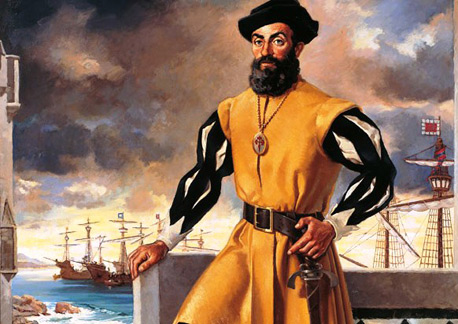Explorers opened up a new world
By Amal Hewavissenti
The exploration of the New World effected a massive wave of
prosperity to Europe which kept on drawing gold, tin, silver, iron one
and other valuable material from the countries of the unknown. As an
inevitable offshoot, Europe acquired a greater wealth and power. On the
other hand, the conventional trade cities such as Constantinople,
Alexandria, Florence, Pisa, Genova and Venica were replaced by new trade
centres such as Lisbon, London, Savle and Antvers.
In an era where the greatest scientific knowledge claimed that the
earth was flat, the great explorers expanded our knowledge of other
lands. During 1000 BC, the Greek and Phoenician traders knowingly or
unknowingly explored vast stretches of the Mediterranean Sea while the
Chinese made voyages to South-East Asia for trade.
|

Ferdinand Magellan |
Here, the Polynesian exploration of the Pacific ocean is not an
exception. North African explorer Ibn Batuta wrote vivid descriptions of
Africa, India, China and Sri Lanka during his adventurous voyages during
14 century. Ibn Batuta, in his boundless enthusiasm to explore,
travelled more than 120,000 kilometres in his life - further perhaps
than Marco Polo who cruised the high seas at about the same time.
Obstruction
With the surrender of Constantinople to Turkey Ottoman expire in
1453, European countries encountered a great obstruction in transporting
goods and articles from the new lands through the sea. As the prices of
such articles were immensely higher, the Europeans set about uncovering
new sea routes to the East, specially to India to establish new trade
centres.
Meanwhile, Christopher Columbus, with the royal patronage of
Ferdinand and Issabella of Spain, set sail on a voyage to discover the
new world towards the west of Europe through the Atlantic ocean. On this
historic voyage Columbus 'discovered' the islands of Cuba and Haiti and
landed on the coast of Bahama which he imagined to be India.
On subsequent voyages he 'discovered' the Caribbean islands and the
American continent which too he conceived to be India. Yet the Italian
explorer Amerigo Vespushi concluded that it was a different region and
not India after further explorations. A German geographer included the
new continent in the world map and named it America, after Amerigo
Vespushi.
During the latter half of the sixteenth century English navigators
such as Drake, Ralley and Gilbert explorer several regions of North
America and established new trade centres in an area from St Laurence to
Florida.
The French too were enthusiastic in exploring North America and
Jacques Cartier discovered the river of St. Laurence in 1535. Lassalet
and Joilett traversed through North America till they came to the
Mississippi river.
With the discovery of Quebec by French navigator Champlaign, the
French captured the area from St. Laurence river to Mississippi entuary.
Apart from that, navigators from Spain and Portugal captured some
regions of the new continent and established settlement. This process of
naval exploration of new lands brought to Europe a variety of goods and
articles which the Europeans had been totally ignorant of before. Cocoa,
Potatoes, tobacco, sugar cane, whale fat, tea, coffee, porcelain, gold,
silver and other valuable material were shipped in enormous quantities
to Europe. And - this made Europe immensely wealthy.
Antipathy
These marine explorations sometimes gave birth to serious antipathy
between nations and countries. English and Spain were in fierce
competition and hostility on account of discovery of new lands. At the
climax of this hostility England vanquished Spain's naval force when
Spain threatened to invade England by using her naval force.
In the wake of the discoveries of new continents, great battles
ensued among the English, Spanish, Dutch, French and the Portuguese.
However, with the new trend, the Europeans exploited their wealth and
power to exert their influence to other countries. This trend was well
supported by rulers such as Navigator Henry who offered full patronage
for explorers and even established a special research centre for
navigational operations. Astronauts, navigators and geographers who were
supported by Navigator Henry contributed much to the success of
navigation teams who later discovered Madeira islands.
These explorers brought gold and slaves from Sudan and Senegal and
this paved way for a broader Portuguese empire in the century to come.
Lafor Gonzalvez's crossing of the equator and the discovery of Cape of
Good Hope by Bertholamuse Dies were the landmark achievements in
exploration.
The arrival of Vasco da Gama to the Calicat harbour of India through
the Cape of Good Hope was a remarkable victory in the history of
navigational explorations.
Ferdinand Magellan who joined Vasco da Gama in navigation strongly
believed that the earth was a globe. Fired with the passion to navigate
round the world, Magellan obtained five ships and 267 sailors from king
Charles I and set sail from Spain in 1519. He managed to arrive in
Pacific ocean and the islands of Phillippines.
Unfortunately Magellan's sailors died of illnesses on the voyage and
Magellan was killed in a conflict with the native inhabitants of
Phillippines.
Ferdinando Cortez of Spain who too was a master navigator invaded
Mexico and became the governor there.
In 1553, Spanish navigator Francisco Pizzaro captured the power of
the country Peru after defeating the tribal community Incas. However,
the Spanish succeeded in establishing colonies and expand their empire
in the new world that the Europeans discovered. |

